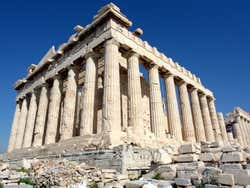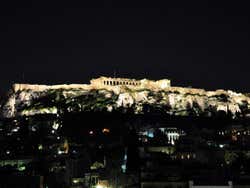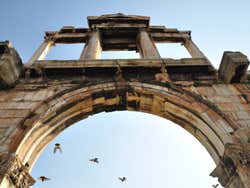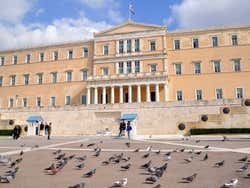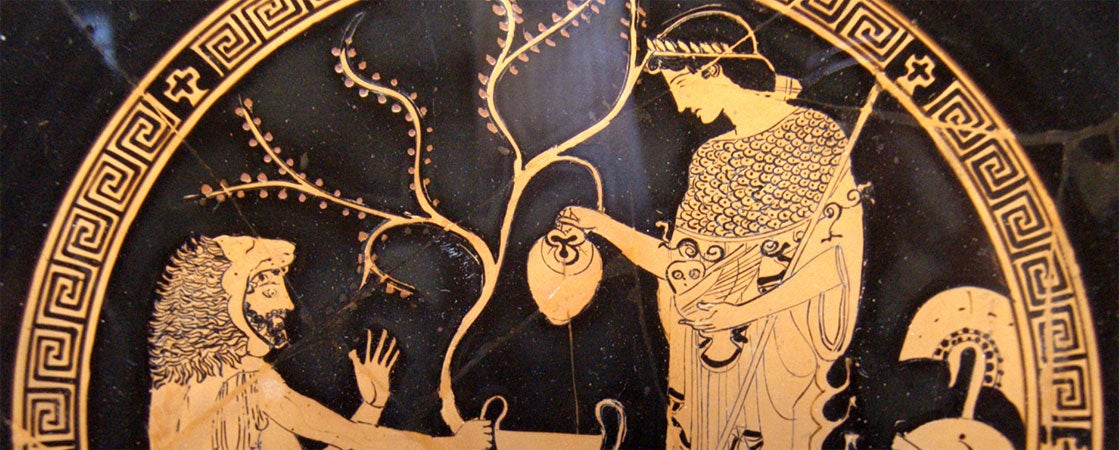
History of Athens
Cradle of western civilization, the history of Athens is eventful and fascinating. Discover the city’s past from its foundation until it became the cultural, economical and political hub of Greece.
Foundation and monarchy
Athens is named after Athena, the Greek goddess of wisdom and war, and daughter of Zeus. The story of Athena is very similar to the story of the founding of Greece.
The first settlers in Athens were from various ethnic groups that were organized in several kingdoms. They established themselves near the crag, which later would become the Acropolis.
According to the Greek mythology, Cecrops, who was half man and half serpent, founded Athens and became the first king. Around the tenth century B.C., the settlers formed twelve cities, of which Athens was always dominant.
The mythical king Theseus was responsible for unifying the cities in Attica under Athens after subduing his main competitor, the town of Eleusis. When the cities were unified, the Panathenaic Games were held in honor of Athena.
When Athens was ruled by kings, the monarch directed the political and military affairs and was assisted by the Areopagus, the king’s court.
Athens evolved from a city dominated by the monarchy, then the aristocracy and eventually gave way to Athenian democracy.
From oligarchy to democracy
During the eighth century the monarchy was replaced with nine Archons, meaning ruler in Greek. These were elected rulers of the Eupatridae (the nobility of Athens).
The social tumult obliged the aristocracy to make concessions for the rest of the population. To avoid the abuses of power, the laws were written down.
In 621 B.C., Draco was the first legislator in Ancient Greece to impose a written law code that would become famous as an example of severity, but was a great step compared to the primitive justice system which had existed before.
Draco was replaced by Solon, one of the seven sages of Greece, renowned for his honesty and patriotism. He made new concessions to the working classes, considered the germ of the first democracy on earth. Solon was elected Archon in 594 and made great reforms, including forgiving the peasants their debts, limiting the right to life and death of the father of the family and dividing the population into four groups according to their income and their military service. He also formed the boule, a council of 400 or 500 people and the Ekklesia (assembly) and the Heliaia (court).
After the wise Solon, there were new social revolts that fractioned the city until Peisistratus took control of Athens by force, so he was considered a tyran. He was succeeded by his sons that compared to their father were a lot more brutal, which created more division among the Athenians. Eventually, Cleisthenes, leader of the democratic movement in 508 B.C. granted citizenship to all free men and reformed the constitution of ancient Athens.
510 B.C. is considered the year of the birth of Athenian democracy.
Cleisthenes reorganized the boule with 500 members that represented the ten tribes in Athens. The Areopagus was also reformed with three members and the Arconte, ten members. The Ekklesia also grew considerably, integrating the Metics, which were the foreigners living in Athens and the Freedmen.
Cleisthenes is famous for establishing the “politically ostracized” figure. To defend democracy from tyranny, the Ekklesia had the power to banish for a certain period a citizen that was perceived as a threat for the popular sovereignty. Each citizen had the right to a secret vote, where they would write the person’s name on an ostracon (piece of pottery).
The Age and Pericles
The fifth century B.C. is also known as the Golden Age of Athens or “The Age of Pericles”. Pericles was a prominent and renowned political leader that did important reforms to democracy, by establishing the theorikon, a fund for subsidizing attendance at public festivals. He encouraged artists and writers to praise Athens and commissioned beautiful monuments and buildings with the Allies money. He was also very interested in science and encouraged its development. Imposing temples and landmarks were erected during his time in power, including the Temple of Athena Nike , the Erechtheion, and the the Parthenon (symbol of Athens), on the Acropolis. During the Golden Age of Athens, 250,000 people lived in the city.
The fifth century is also significant because of the Greco-Persian Wars and the Peloponnesian War (Athens and Sparta).
In 499 BC, Athens was involved in a series of battles against Persia called the Greco-Persian Wars. The Athenian army defeated the Persian king Darius I in 490 B.C. in the Battle of Marathon under the command of Miltiades. The soldier Philippides became famous during this battle for his race to tell Athens of the victory. This led to the creation of the marathon race.
During the second battle, the son of king Darius I, Xerxes I, attacked Athens and destroyed the Acropolis, but were defeated once more at the Battle of Salamis in 480.
At that time, Athens was a maritime power and it used this power to form an alliance that neutralized the Spartan hegemony. During this prosperous period, the political leaders were always from the wealthy families.
Athens and Persia went to war once more in 468 B.C. in the Battle of Eurymedon, and Persia was defeated again.
After its victory, Athens became even more powerful and imposed its dominion over the other Greek cities (“polis” in Greek). This displeased the rest of the cities and finally led the city of Samos to revolt in 440, followed by Thebes, Megara and Corinth. Eventually, the potent Sparta rebelled, and this led to the Peloponnesian War (431 – 401 B.C.).
After many years of war, Athens was defeated by Sparta and was further weakened by the outbreak of the plague, which arose with the overcrowding of the city. One-third of the population was killed by the epidemic, including Pericles.
After the Peloponnesian War, the democratic state of Athens was overruled by an oligarchy in favour of Sparta called The Thirty Tyrants, which only lasted eight years until democracy was restored.
During the Corinthian War (395 – 387 BC), Sparta’s previous allies fought along Athens against Sparta, establishing the Second Athenian League. Athens then turned against Thebes along side Sparta.
During the fourth century, Athens suffered a social, cultural and political decadence, weakened by the war. Many citizens lost their wealth and the statesman Eubulus organized new public holidays to appease the common people.
During this period, the kingdom of Macedon became more and more important and finally defeated Athens and other Greek cities at the Battle of Chaeronea, dissolving Athens independence.
Hellenistic Athens
After Philip's reign, Alexander the Great succeeded him and swiftly quelled any potential revolts in Athens. Following Alexander's death, the Hellenistic period began, during which Athens emerged as a major center for arts and sciences, maintaining its cultural prominence for several centuries.
In the 2nd century BC, Athens came under the influence of Rome. By 146 BC, it was formally incorporated into the Roman Empire. Despite this, in 88 BC, Athens allied with Mithridates VI, king of Pontus, in a rebellion against Roman rule. In response, the Roman general Sulla besieged and sacked the city in 86 BC, causing extensive destruction to its monuments and carrying out a brutal massacre of its inhabitants.
Despite this devastation, Athens remained a vital intellectual hub of the era. While politically dependent on Rome, culturally, it was Athens that influenced Roman thought. For three centuries, Athens became the world’s foremost cultural and educational capital, attracting students from across the known world.
As the Roman Empire faced barbarian invasions, Athens shared in its fate. It was first attacked by the Goths in 253 AD, then by the Heruli in 267 AD, and finally by Alaric and the Visigoths in 396 AD.
When the Roman Empire split, Athens became part of the Eastern Roman (Byzantine) Empire in 395 AD. The city's decline as a cultural center continued when, in 529 AD, Emperor Justinian I ordered the closure of its philosophical schools, seeing them as strongholds of pagan resistance to Christianity. Temples were converted into churches, and Athens' role as a pagan intellectual stronghold came to an end.
Medieval Period
Athens declined when the Byzantine Empire became Christian. Several centuries later, the city was plundered by the Normans who had conquered Sicily and the south of Italy.
Athens prospered during the eleventh and twelfth century and many of the Byzantine churches were built during this period.
However, in 1204 the Crusaders conquered Athens after occupying the Byzantine Empire and less than two centuries later, in 1456, it was occupied by the Ottoman Turks. The city’s churches were transformed into mosques.
Modern history
The Venetians conquered Athens from the Ottoman Empire in 1687. During the conflict for the control of the city, the Parthenon was accidently blown up and severely damaged. The building was then further sacked by the Venetians until they retreated a year later and was once again under Turkish dominion.
The city, much reduced, since the rule of the Ottoman Empire revolted in 1822, but it was once again captured by the Ottoman Turks. The Ottomans finally left Athens in 1833.
In 1832, the Great Powers that was made up by United Kingdom, Russian Empire and France founded an independent state of Greece. The appointed king was son of Ludwig II of Bavaria, king Othon of Greece. On 18 September 1835, Athens was elected capital of the country and numerous public buildings were constructed during this period.
After World War I, Greece, administered by Prime Minister Eleftherios Kyriakou, was promised new territory in Ottoman Turkey by some of the western Allies. This led to the Greco-Turkish War between 1919 and 1922.
The Turkish crushed the Greeks in Smyrna and as a result, the Greek and Turkish decided to exchange their population, forcing thousands of Greeks living in Turkey to move back to Greece and becoming refugees and vice versa. Most Greek citizens returned to Athens, creating a havoc in the city.
The 25 March 1924, after a turbulent past, the Republic was proclaimed. In 1936 Ioannis Metaxas became dictator of Greece until his death in 1941.
Although Metaxas applauded some of Mussolini’s ideals, he remained neutral when World War II broke out. The city was shortly afterwards occupied by the Italian troops, but were pushed out by the Greeks. In 1941, the German troops invaded Greece until 1944.
After the Second World War, many of the country’s rural population moved to Athens and the city grew rapidly.
In 1946, a civil war broke out between Left-wing supporters and the conservative government, supported by the British and the Americans. The conservatives eventually won.
In 1967 several colonels organized a coup d’état and enforced a dictatorship which ended in 1974.
In 1981, Greece became a member state of the European Union and in 2001, adopted the Euro as its official currency. Becoming a member state and the 2004 Olympic Games led to a great reform of the city and its main buildings.
Currently the city is the political, economical and cultural hub of Greece and one of the most popular tourist destinations.
